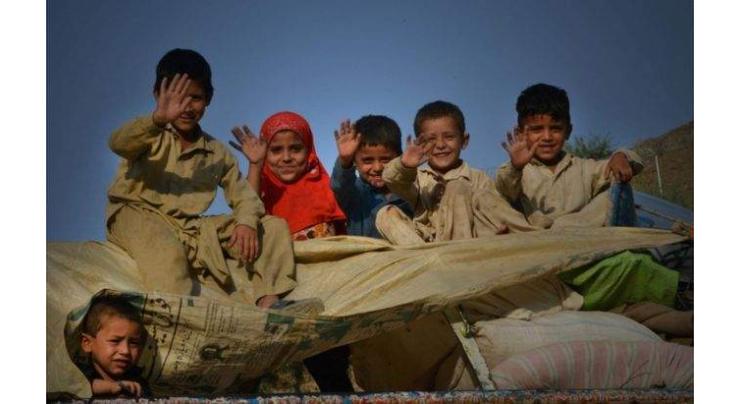
A Third Of Afghans Will Need Aid This Year: UN
Fahad Shabbir (@FahadShabbir) Published January 23, 2017 | 03:25 PM

As violence spread across Afghanistan in 2016, about 1,700 people per day were displaced from their homes, reaching a record annual figure of over 600,000, the United Nations said. Hundreds of thousands also returned from neighbouring Pakistan, many of them becoming displaced in their own country because their home districts were not safe to return to.
The number of people in need of assistance stands at 9.3 million, a 13 percent increase from the previous year, the United Nations said. Mark Bowden, the United Nation's humanitarian aid coordinator in Afghanistan, said that the country faced an "exceptional" challenge and that the scale of its population movement is second only to Syria's.
"The current scale of need in Afghanistan calls upon the humanitarian community to deliver increased levels of assistance to ensure the lives of many Afghans are not endangered, and so that they can live in safety and dignity," Bowden said.
The US $550 million requested for humanitarian aid would bring emergency food and health care to about 5.7 million people, the United Nations said. The world body also painted a bleak picture of Afghanistan's broader humanitarian needs, despite billions of dollars spent over the past 15 years to improve people�s livelihood.
About 40 percent of the population remains out of reach of health services, 1.57 million people face severe food insecurity and a million children are malnourished, the United Nations said. Abdullah Abdullah, the chief executive of the Afghan government, said that of the $550 million requested for 2017, about $240 million would go toward emergency needs and assistance for refugees.
"This appeal is the biggest appeal for humanitarian aid in Afghanistan, and the reason is the continuation of war and the return of refugees," he said. With no end to the war in sight, the United Nations expects tens of thousands more to be displaced by violence in the year ahead.
It is also preparing for the return of a million Afghan refugees from neighboring countries, particularly Pakistan, whose government has cracked down on undocumented Afghans living there. Anders Sjoberg, the Swedish ambassador to Afghanistan, emphasized the need to continue long-term development initiatives to improve standards of living.
But the central problem, he said, is the war. "The long-lasting conflict in Afghanistan is at the core of the humanitarian crisis,� he said, �and there is an urgent need to bring the war to an end."
Related Topics
Recent Stories

Punjab CM inaugurates Pakistan’s first Virtual Women Police Station

Dutch model Donny Roelvink embraces Islam

Experts raise concerns over introduction of 10-stick packs

Iranian president arrives in Karachi

Law Minister expresses Govt's resolve to address issue of missing persons

Rizwan’s batting order may be changed: Sources

Nawaz Sharif to visit Guangzhou exhibition in China

FM Dar not traveling to China: Foreign Office

PM takes notice of deliberate delay in tax cases

Iranian President visits Allama Iqbal’s mausoleum

Iranian President arrives in Lahore today

Currency Rate In Pakistan - Dollar, Euro, Pound, Riyal Rates On 23 April 2024
More Stories From Pakistan
-
Iranian President reiterates commitment to promote bilateral relation with Pakistan
4 hours ago -
KP CM chairs meeting of Integrated Security Architecture’s apex committee
5 hours ago -
President Raisi accorded warm welcome on arrival in Karachi
6 hours ago -
Spending quality time in nature may lower heart disease, diabetes risk: Study
6 hours ago -
President Raisi pays respects at Quaid's mausoleum
6 hours ago -
FM Dar speaks to overseas Pakistanis via Zoom
6 hours ago
-
Govt to form parliamentary committee to end violence in Balochistan: CM Bugti
6 hours ago -
LESCO collects over Rs 4.48m from 104 defaulters in 24 hours
6 hours ago -
Dr. Jamileh calls for role of Muslim women for promotion of Islamic culture
6 hours ago -
LESCO detects 73,722 power pilferers in 217 days
6 hours ago -
Farmers express concerns on low wheat price in market
6 hours ago -
CEO SEPCO for taking action against those involve in over billing & power theft
7 hours ago